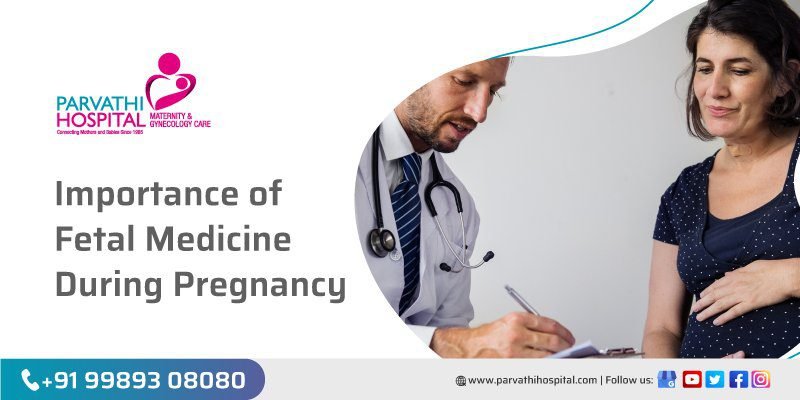Subtotal $0.00
Importance of Maternal Fetal Medicine During Pregnancy
Whether you are expecting a baby or trying to conceive, one thing remains constant: the baby’s and the mother’s health come first. Furthermore, every expectant parent has a million questions flying through their heads, especially when dealing with a high-risk pregnancy. Fetal medicine is a branch of obstetrics and gynecology dedicated to caring for the unborn infant (fetus) before and during pregnancy and monitoring high-risk pregnancies via fetal screening and ultrasounds. Fetal medicine specialists at Parvathi Hospital discuss fetal medicine and the need to get ultrasounds during pregnancy to maintain fetal well-being and to discover anomalies on time to provide the best outcome for both mother and baby. The fetal medicine department of Parvathi Hospital is equipped with the latest equipment for fetal screening, ultrasounds, and surgeries.
What is Fetal Medicine During Pregnancy?
Fetal medicine, often known as maternal-fetal medicine (MFM), is concerned with the health of the mother and fetus before, during, and after pregnancy. Perinatology is another term for fetal medicine. Obstetricians/gynecologists specializing in fetal medicine are trained to assess and manage high-risk pregnancies. These specialists have advanced knowledge of complications in pregnancy, be they medical, surgical, or genetic.
Who is a Maternal-Fetal Medicine Specialist?
A maternal-fetal medicine specialist, often known as an MFM specialist, is a healthcare professional who assists a pregnant woman with self-care in the event of a problematic or high-risk pregnancy.

MFM specialists are doctors who complete an additional three years of training in high-risk pregnancy to provide extra comfort and care to moms. Being pregnant with twins, triplets, or quadruplets is a high-risk pregnancy, so having an MFM specialist on your medical team can be highly beneficial.
What Does an MFM Specialist Do?
MFM specialists are critical before and during pregnancy if you are at risk for difficulties, but they are also crucial in low-risk pregnancies. The following is the list of duties that an MFM specialist does.
Managing the mother’s existing health issues, such as diabetes, high blood pressure, anemia, etc.
Giving regular prenatal and postoperative care to women with high-risk pregnancies
Providing emotional and psychological support during pregnancy or labor.
Managing post-delivery issues like excessive bleeding, swellings, infections, or high blood pressure
Handling the tests, results, and procedures (such as ultrasound, blood tests, and so on) to keep an eye on the baby’s development and progress.
Identifying and managing congenital disabilities like heart problems and blood disorders in a developing baby using various tests.
When Should I See an MFM Specialist?
Fetal medicine specialists specialize in high-risk pregnancies, which means they can treat any ailment or scenario that threatens the mother or the fetus’ life. A fetal medicine specialist will monitor and treat some of the following conditions: High blood pressure, Kidney or Heart disease, Blood clotting issues, Diabetes during pregnancy, Pregnancy with multiple births, Disorders of seizure, Advanced maternal age, Preeclampsia (toxemia), Diseases caused by viruses, Recurrent miscarriage, and Unusual fetal growth.
If you think you have an existing condition while attempting to conceive or while pregnant, you should tell your doctor, who will refer you to the appropriate specialist. If your doctor believes it is required during pregnancy, they will send you to a fetal medicine specialist.
What Happens During a Visit?
During a perinatology session, patients can expect a complete ultrasound examination of the fetus’ anatomy. If necessary, amniocentesis is one of the examinations that can be conducted. A little sample of amniotic fluid, the liquid that surrounds the fetus, is taken during the process. The sample provides genetic information that can be used to diagnose illnesses like open neural tube defects such as spina bifida, which occurs if the spine and spinal cord do not develop properly.
Why Every Couple Needs an MFM Doctor in their Pregnancy Team
Regular medical checkups, good prenatal care, and a healthy lifestyle are critical for the woman and the baby inside her, whether the pregnancy is normal or high-risk. When it comes to challenging situations like this, a professional opinion can also go a long way toward delivering health and happiness. As a result, do not make any compromises; if times are difficult, we recommend seeking help from a certified maternal-fetal medicine professional as soon as possible.
Parvathi Hospital Has the Best Fetal Medicine Department
The team of fetal medicine specialists at Parvathi Hospitals uses diagnostic ultrasound, visibility scan, NT scan, diagnosis, counseling, and management of multiple pregnancies to monitor the health of both mother and child throughout the pregnancy to detect any possible early complications and intervene at the appropriate time.
Contact Parvathi Hospital for the Best Fetal Medicine Services in Hyderabad. Parvathi fetal medicine doctor provides specialist care to pregnant women and their kids. The doctors have received years of specialized training in assessing and managing high-risk pregnancies.

FAQs
1. What is fetal medicine?
Fetal medicine is the branch of medicine that deals with the mother and the fetus (or fetuses). This involves fetal growth and well-being assessments, identifying and treating fetal diseases (including fetal anomalies), and parent counseling and support.
2. Why do we refer to fetal medicine?
Suppose you have a pre-existing medical issue before pregnancy, acquire a medical condition during pregnancy, or have problems during birth. In that case, you may be sent to a maternal-fetal medicine specialist. If your baby has an anomaly, you will also see a maternal-fetal medicine specialist during pregnancy.


Comments are closed